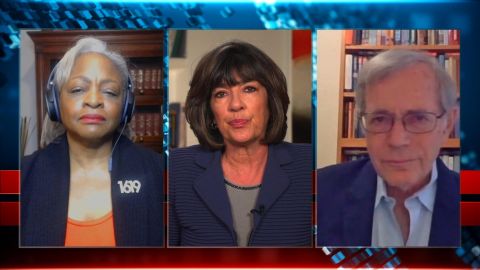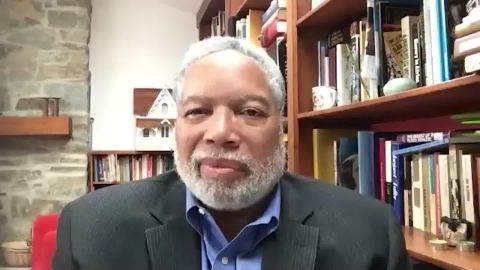Read Transcript EXPAND
CHRISTIANE AMANPOUR: After all the work you have done on the history that you teach and that you’re so intrinsically involved in, how shocking has it been for each of you to see what we’re seeing, certainly with the death of — the killing of George Floyd, and before that, Ahmaud Arbery, and before that, you know, Breonna Taylor, all of these people you we’ve seen. Let me just ask you first, Professor Anderson.
CAROL ANDERSON, PROFESSOR OF AFRICAN-AMERICAN STUDIES, EMORY UNIVERSITY: The deaths haven’t been shocking because they’re part of a pattern, but I think it’s been the convergence of the coronavirus, the economic collapse and Trump that have really laid bare and led to this kind of uprising and this call for really understanding our history so that we don’t keep doing this. And that’s been heartening, seeing that kind of activism.
AMANPOUR: Professor Foner, to you. Are you heartened by the activism and also by the sort of cross-racial protests that we’ve seen? It’s an uprising on the streets today that’s not just within the black community but for the black community by whites and others as well?
ERIC FONER, PROFESSOR EMERITUS OF HISTORY, COLUMBIA UNIVERSITY: Yes, I agree. I find the events that are going on now inspiring, actually. I mean, I have — I’m old enough that I’ve seen these movements come and go. The civil rights revolution of the 1960s, et cetera. But I think you’re right, it’s not just the multiracial character of these protests and marches, but the fact that they’re happening all over the country, including in really small towns and cities that have never been a major focus of racial justice demonstrations. So, yes, I think it’s a wonderful moment in a way, even though the things that are being protested are, you know, dire problems in American life.
AMANPOUR: And it is extraordinary because all over the world we’re seeing it as well, here in the U.K., in Africa, elsewhere, you know, their rights are being questioned as well. The colonial history is being revisited as well. I mean, it’s a real — seems like a massive global moment. So, I want to ask you, Professor Anderson, maybe we weren’t as familiar with Juneteenth as we should have been on a mass scale. What is the significance of it, and particularly as it relates to today?
ANDERSON: I think that the significance is that you get this moment where the general from the U.S. army gets to Galveston, Texas in June 19, 1865 and informs the enslaved that they are, in fact, free.
About This Episode EXPAND
On this Juneteeth, Christiane speaks with historian Eric Foner and author Carol Anderson about why the day is particularly meaningful this year. She also speaks with Malcolm Gladwell about the current moment in race relations. Walter Isaacson speaks with Lonnie Bunch, Secretary of the Smithsonian Institution, about putting the day in historical context.
LEARN MORE


